 Ghostdrift (Finder Chronicles #4) by Suzanne Palmer
Ghostdrift (Finder Chronicles #4) by Suzanne Palmer Narrator: Paul Woodson
Format: audiobook, eARC
Source: purchased from Audible, supplied by publisher via NetGalley
Formats available: hardcover, ebook, audiobook
Genres: science fiction, space opera
Series: Finder Chronicles #4
Pages: 384
Length: 13 hours and 37 minutes
Published by Blackstone Publishing, DAW on May 28, 2024
Purchasing Info: Author's Website, Publisher's Website, Amazon, Barnes & Noble, Kobo, Bookshop.org, Better World Books
Goodreads
The fourth and final installment of the Finder Chronicles, a hopepunk sci-fi caper described as Macgyver meets Firefly, by Hugo Award–winner Suzanne Palmer
Fergus Ferguson, professional finder, always knew his semi-voluntary exile wouldn’t last, but he isn’t expecting a friend to betray him. One of the galaxy’s most dangerous space pirates, Bas Belos, wants him, and what Belos wants, he gets. Belos needs help finding out what happened to his twin sister, who mysteriously disappeared at the edges of space years ago, and he makes Fergus an offer he can’t refuse.
Mysterious disappearances and impossible answers are Fergus’s specialties. After he reluctantly joins Belos and his crew aboard the pirate ship Sidewider, he discovers that Belos is being tracked by the Alliance. Seeking to stay one step ahead of the Alliance, Fergus and Belos find themselves marooned in the middle of the Gap between spiral arms of our galaxy, dangerously near hostile alien territory, and with an Alliance ship in hot pursuit.
That’s just the beginning of the complications for Fergus’ newest—and possibly last—job. The puzzle is much bigger than just Belos’s lost sister, and the question of his future, retirement or not, depends on his ability to negotiate a path between aliens, criminals, and the most powerful military force he’s ever encountered. The future of entire planets hangs in the balance, and it remains to be seen if it’s too big for one determined man and his cranky cat.
My Review:
I couldn’t resist. Even though I knew going in this was one of those situations where you don’t know whether to cry because it’s over or smile because it happened, I had to find out just what happened to Fergus Ferguson that led to Ghostdrift being the final book in the utterly awesome Finder Chronicles.
 Over the course of the series (Finder, Driving the Deep, The Scavenger Door and now Ghostdrift), Fergus has proven to be the consummate survivor. Not because he’s particularly good at any one thing except finding the stuff he’s been contracted to find, but because no plan seems to survive contact with Fergus – not even his own. No matter how big and how scary the villains are, no matter how many layers within layers of plans they have to get away with whatever it is they think they’re getting away with, the minute Fergus happens to them Murphy’s Law arrives in his wake and the shit keeps hitting the fan – both theirs and his – until he emerges from the wreck of everything they expected.
Over the course of the series (Finder, Driving the Deep, The Scavenger Door and now Ghostdrift), Fergus has proven to be the consummate survivor. Not because he’s particularly good at any one thing except finding the stuff he’s been contracted to find, but because no plan seems to survive contact with Fergus – not even his own. No matter how big and how scary the villains are, no matter how many layers within layers of plans they have to get away with whatever it is they think they’re getting away with, the minute Fergus happens to them Murphy’s Law arrives in his wake and the shit keeps hitting the fan – both theirs and his – until he emerges from the wreck of everything they expected.
It’s a gift. It’s also a curse. A judgment that does not depend on whether you are on the side of Fergus or his enemies. As I said, Fergus’s own plans don’t survive contact with him either.
But it does explain why his friend (or sometimes frenemy) Qai doesn’t feel all that terrible about kidnapping Fergus and delivering him – alive and unharmed, along with his cat Mister Feefs – into the custody of notorious space pirate Bas Belos in exchange for the safe return of Qai’s partner Maha – yet another of Fergus’s friends.
Qai knows Fergus can handle himself and knows that Belos’ plan isn’t likely to survive Fergus either. She’s basically delivering her revenge on Belos for kidnapping her partner in a Fergus Ferguson shaped form and isn’t sorry about it in the least.
She’s sure she’s brought Belos more trouble than even an interstellar space pirate can handle. And she’s right. It’s the way in which she’s right and the places that right takes the pirate, his ship, his crew, Fergus AND Mister Feefs, that makes the whole entire story.
Fergus’s story. Belos’s story. And quite possibly the whole damn universe’s story – again – if Fergus doesn’t manage to pull off one more doggedly determined find.
 Escape Rating A+: June is Audiobook Month, and this final book in the Finder Chronicles was the perfect audiobook to listen to this month, particularly as I listened to the first book in the series, Finder, in June of 2019.
Escape Rating A+: June is Audiobook Month, and this final book in the Finder Chronicles was the perfect audiobook to listen to this month, particularly as I listened to the first book in the series, Finder, in June of 2019.
Even though I didn’t want this story to end – I desperately needed to know how it ended, so I started alternating between audio and text just past halfway – as much as I hated to miss out on the totality of narrator Paul Woodson’s perfect read of Fergus Ferguson’s universe-weary, ‘been there, done that, got all the t-shirts’ voice.
(Fergus really does have all the t-shirts – and he wears them throughout the series. The man has definitely been around.)
The series as a whole rides or dies on that voice, to the point that if you like Fergus you’ll love the series but if he drives you as insane as he does the people he runs up AGAINST you probably won’t. Also, if you like a universe-weary, first-person or first-person focused protagonist, you’ll probably also love Michael Mammay’s Carl Butler in his Planetside series. (I digress, just a bit.)
What about this particular entry in the series? It combines some really classic tropes into one single terrific story.
First there’s the whole ‘White Whale’ angle. Actually, it’s two of those angles. On the one hand, pirate captain Bas Belos just wants to find out what happened to his twin sister and her crew. It’s been ten years since she disappeared, he knows that the ‘Alliance’s’ claim that they killed her and hers was a lie. He’s kidnapped/hired Fergus to lead him towards closure – no matter what it takes.
And then there’s the real Captain Ahab of this story, an Alliance captain for whom Bas Belos is his white whale, and he’ll trail the pirate literally past the end of the galaxy to catch him – even if he’s leading his crew straight to their demise. And wasn’t that Ahab all over?
But then there’s the third corner of this delicious story, the one where Belos and his crew, the Alliance captain and his, all end up stranded in the gap between galaxies, on a little tiny planet that threatens to be their own ‘Gilligan’s Island’ – because it already has.
 Together, those three plots, Belos’ need for closure, Captain Ahab – actually Captain Todd – following Belos where no one REALLY should have gone before, or again, and all the crews stuck on their very own tiny Gilligan’s Island planetoid, doing their best – or worst – to get along well enough to get back home.
Together, those three plots, Belos’ need for closure, Captain Ahab – actually Captain Todd – following Belos where no one REALLY should have gone before, or again, and all the crews stuck on their very own tiny Gilligan’s Island planetoid, doing their best – or worst – to get along well enough to get back home.
With Fergus in the middle, knowing his personal goose is cooked either way. Unless he can find a really, truly, seriously out-of-the-box solution for his own dilemma as well as theirs.
I loved this last adventure in the Finder Chronicles. On top of this beautiful layer cake of a story, there was also a bit of marvelous icing in Fergus’ relationship with Mister Feefs that will add extra feels for anyone who has ever loved a companion animal and grounded their very existence on that love. (Don’t worry about Mister Feefs, he comes out of this adventure just fine – it’s Fergus we have to worry about. As usual.)
The only sour note in this whole thing is in the author’s note at the end, where she declares that this really is Fergus’ last recorded adventure. And it could be, she left him in a good place – WITH MISTER FEEFS – and they’ll be just fine. But she also left them in a place where it’s clear that Fergus will manage to make his way back to his own galaxy, one way or another, given enough time and supplies. And he has the supplies. So he could come back. We could come back at some point in the future to see whose plans Fergus is destroying at that point in his life. I don’t expect we will, but I can still hope.


 We Speak Through the Mountain (Annual Migration of Clouds, #2) by
We Speak Through the Mountain (Annual Migration of Clouds, #2) by  Escape Rating B+: I had not read
Escape Rating B+: I had not read  The Bodies in the Library (First Edition Library Mystery, #1) by
The Bodies in the Library (First Edition Library Mystery, #1) by  The discovery of a body in the Society’s library, the morning after a contentious meeting of a local writers’ group, seems a bit too much like it’s straight out of the pages of one of the Agatha Christie novels sitting on a nearby shelf, The Body in the Library.
The discovery of a body in the Society’s library, the morning after a contentious meeting of a local writers’ group, seems a bit too much like it’s straight out of the pages of one of the Agatha Christie novels sitting on a nearby shelf, The Body in the Library. Speaking of media, however, the audio was fine, and it certainly got me over the rough first third of the book that drove me away the first time around. So I’m glad I picked it up – even though once the story finally got started I got more than caught up in it enough to want to find out whodunnit a whole lot faster than audio would allow.
Speaking of media, however, the audio was fine, and it certainly got me over the rough first third of the book that drove me away the first time around. So I’m glad I picked it up – even though once the story finally got started I got more than caught up in it enough to want to find out whodunnit a whole lot faster than audio would allow.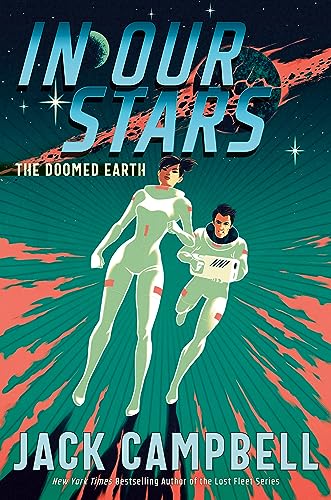 In Our Stars (The Doomed Earth, #1) by
In Our Stars (The Doomed Earth, #1) by  Escape Rating B: I couldn’t get the resemblance to Trek out of my head, and that affected my reading of this book a lot because it felt just a bit too familiar. To the point where even though I didn’t know what was coming, I sorta/kinda knew what was coming. Also, to the point where I couldn’t resist falling down a Trek time travel rabbit hole. Or should I say, a time travel black hole, because that device was used frequently and often, even if that’s not quite what happened here.
Escape Rating B: I couldn’t get the resemblance to Trek out of my head, and that affected my reading of this book a lot because it felt just a bit too familiar. To the point where even though I didn’t know what was coming, I sorta/kinda knew what was coming. Also, to the point where I couldn’t resist falling down a Trek time travel rabbit hole. Or should I say, a time travel black hole, because that device was used frequently and often, even if that’s not quite what happened here. Every Time We Say Goodbye (Jane Austen Society, #3) by
Every Time We Say Goodbye (Jane Austen Society, #3) by  I picked this up because I loved the author’s earlier book,
I picked this up because I loved the author’s earlier book,  Escape Rating B: Before I get to the story of the book, I absolutely need to say something about the audiobook. Specifically, that the audiobook is excellent. The reader, Juliet Aubrey, was a perfect choice and she made the whole thing better and carried me through even at points where I wondered how the parts of the story connected to each other because she was just awesome.
Escape Rating B: Before I get to the story of the book, I absolutely need to say something about the audiobook. Specifically, that the audiobook is excellent. The reader, Juliet Aubrey, was a perfect choice and she made the whole thing better and carried me through even at points where I wondered how the parts of the story connected to each other because she was just awesome. .
. L. Ron Hubbard Presents: Writers of the Future, Volume 40 by
L. Ron Hubbard Presents: Writers of the Future, Volume 40 by 
 Funny Story by
Funny Story by  Escape Rating A: I started out listening to this one, and that’s probably what got me over the hump of the early chapters. This is one of those stories that, of necessity, has a very hard start. We meet Daphne just after very nearly the entire life she had planned crashed and burned. She’s wallowing in a whole lot of angst and regret and self-recrimination, nearly buried by the weight of her emotional baggage piling up all around her. Listening to the excellent narrator makes the listener feel like they are literally inside Daphne’s mostly despairing head and it’s a realistically well-portrayed terrible place to be.
Escape Rating A: I started out listening to this one, and that’s probably what got me over the hump of the early chapters. This is one of those stories that, of necessity, has a very hard start. We meet Daphne just after very nearly the entire life she had planned crashed and burned. She’s wallowing in a whole lot of angst and regret and self-recrimination, nearly buried by the weight of her emotional baggage piling up all around her. Listening to the excellent narrator makes the listener feel like they are literally inside Daphne’s mostly despairing head and it’s a realistically well-portrayed terrible place to be. That Peter ultimately gets the shaft all the way around turned out to be merely the icing on a very tasty cake of a book – or perhaps that should be the slathering of cheese and jalapenos on a fresh, hot serving of Petoskey fries. The part that makes a good thing just that much better.
That Peter ultimately gets the shaft all the way around turned out to be merely the icing on a very tasty cake of a book – or perhaps that should be the slathering of cheese and jalapenos on a fresh, hot serving of Petoskey fries. The part that makes a good thing just that much better. Chaotic Apéritifs: A Cozy Cooking Fantasy (Hidden Dishes Book 2) by
Chaotic Apéritifs: A Cozy Cooking Fantasy (Hidden Dishes Book 2) by  Escape Rating A-: I’m doing this review a week early so that you have a chance to read the tasty first book in the
Escape Rating A-: I’m doing this review a week early so that you have a chance to read the tasty first book in the 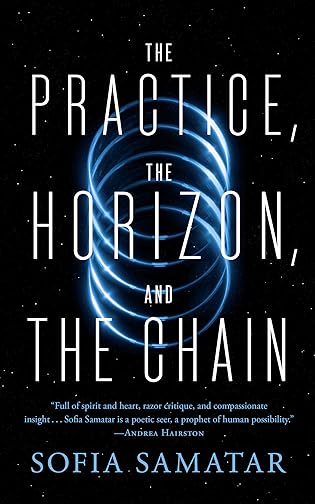 The Practice, the Horizon, and the Chain by
The Practice, the Horizon, and the Chain by  Not that academia doesn’t do plenty of caste stratification of its very own, and not that it can’t be both blood thirsty and bloody minded – particularly in its small-minded, impractical politics. If an exploration of that appeals and you enjoy SF mysteries, Malka Older’s Mossa and Plieti series,
Not that academia doesn’t do plenty of caste stratification of its very own, and not that it can’t be both blood thirsty and bloody minded – particularly in its small-minded, impractical politics. If an exploration of that appeals and you enjoy SF mysteries, Malka Older’s Mossa and Plieti series,  The House on Widows Hill (Ishmael Jones #9) by
The House on Widows Hill (Ishmael Jones #9) by 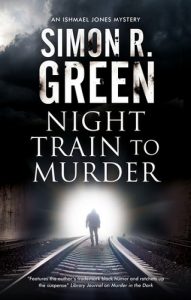 The House on Widows Hill is more of a twist on the typical English country house mystery than even Ishmael Jones and his partner Penny Belcourt usually have to contend with.
The House on Widows Hill is more of a twist on the typical English country house mystery than even Ishmael Jones and his partner Penny Belcourt usually have to contend with.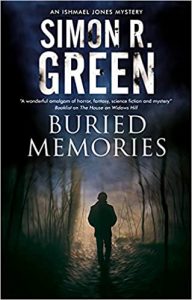 Someone in the ‘Organization’ is considering buying the place – or that’s what Ishmael and Penny are told, anyway. That night is a ‘one-night-only’ invitation to not just Ishmael and Penny as representatives of the potential buyer, but also to a whole team of “ghost botherers” (as Ishmael calls them) who have been begging – for years it seems – to get inside the old haunt. Along with one intrepid reporter who represents the family that owns the creepy pile – and really would like to get shed of the place once and for all.
Someone in the ‘Organization’ is considering buying the place – or that’s what Ishmael and Penny are told, anyway. That night is a ‘one-night-only’ invitation to not just Ishmael and Penny as representatives of the potential buyer, but also to a whole team of “ghost botherers” (as Ishmael calls them) who have been begging – for years it seems – to get inside the old haunt. Along with one intrepid reporter who represents the family that owns the creepy pile – and really would like to get shed of the place once and for all.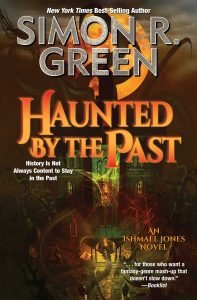 Escape Rating A-: I normally save this series for around Halloween, but I’m in the midst of a reading quandary that I hoped this book would solve – or at least beat back for a couple of days. I’m in the middle of listening to Erik Larson’s
Escape Rating A-: I normally save this series for around Halloween, but I’m in the midst of a reading quandary that I hoped this book would solve – or at least beat back for a couple of days. I’m in the middle of listening to Erik Larson’s 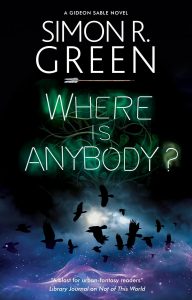 The House on Widows Hill very much has the classic haunted house vibe going on – even though with Ishmael and Penny involved the reader begins the story aware that it just isn’t going to go to any of the places that haunted houses normally go. That Ishmael gets shaken out of some of his internal certainties and securities added a bit to the ongoing arc of the series while at the same time ramping up the tension of both this book and the books in the series yet to come.
The House on Widows Hill very much has the classic haunted house vibe going on – even though with Ishmael and Penny involved the reader begins the story aware that it just isn’t going to go to any of the places that haunted houses normally go. That Ishmael gets shaken out of some of his internal certainties and securities added a bit to the ongoing arc of the series while at the same time ramping up the tension of both this book and the books in the series yet to come.